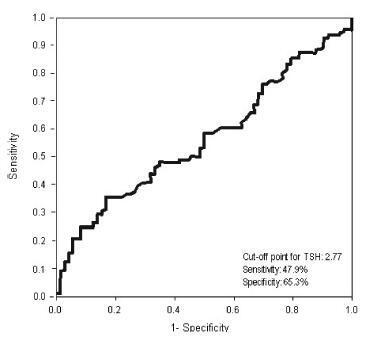Summary
Revista Brasileira de Ginecologia e Obstetrícia. 2021;43(10):736-742
12-17-2021
Thyroid diseases are the second most common endocrine disorders in the reproductive period of women. They can be associated with intrauterine growth restriction (IUGR), preterm delivery, low Apgar score, low birthweight (LBW) or fetal death. The aim of the present study is to explore thyroid dysfunction and its relationship with some poor perinatal outcomes (Apgar Score, low birthweight, and preterm delivery).
Dried blood spot samples from 358 healthy pregnant women were analyzed for thyroid stimulating hormone (TSH), total thyroxine (TT4), and thyroglobulin (Tg). Neonatal data were collected upon delivery. Four groups were formed based on thyroid function tests (TFTs).
Of the 358 tested women, 218 (60.72%) were euthyroid. Isolated hypo thyroxinemia was present in 132 women (36.76%), subclinical hyperthyroidism in 7 women (1.94%), and overt hypothyroidism in 1 (0.28%). The perinatal outcomes IUGR (p = 0.028) and Apgar score 1 minute (p = 0.015) were significantly different between thyroid function test [TFT]-distinct groups. In the multiple regression analysis, TT4 showed a statistically significant inverse predictive impact on LBW (p < 0.0001), but a positive impact of Tg on LBW (p = 0.0351).
Thyroid hormones alone do not have a direct impact on neonatal outcomes, but the percentage of their participation in the total process cannot be neglected. Based on the regression analysis, we can conclude that TT4 and Tg can be used as predictors of neonatal outcome, expressed through birthweight and Apgar score. The present study aims to contribute to determine whether a test for thyroid status should become routine screening during pregnancy.
Summary
Revista Brasileira de Ginecologia e Obstetrícia. 2017;39(5):224-228
05-01-2017
This study analyzed the effectiveness of the thyroid-stimulating hormone (TSH) as a predictor of insulin resistance (IR) and its association with the clinical and metabolic parameters of women with polycystic ovary syndrome (PCOS) without overt hypothyroidism.
A cross-sectional study was performed. Women with PCOS and without overt hypothyroidism (n = 168) were included.
Receiver operating characteristic (ROC) curve was used to determine the cut-off point for TSH that would maximize sensitivity and specificity for a diagnosis of IR using homeostatic model assessment of insulin resistance (HOMA-IR)≥ 2.71. Clinical and metabolic parameters were compared as a function of the TSH cut-off limit and the presence of IR.
Thyroid-stimulating hormone ≥ 2.77 mIU/L was associated with a diagnosis of IR, with sensitivity of 47.9% and specificity of 65.3%. There were no differences in clinical, hormonal or metabolic parameters between TSH < 2.77 and TSH of 2.77 - 10 mIU/L.
In women with PCOS without overt hypothyroidism, TSH ≥2.77 mIU/L is associated with IR; however, with poor sensibility, showing TSH to be a poor predictor of IR in this population. No clinical or metabolic alterations were found that would justify a change in clinical management. Thus, the IR should be investigated in all women with PCOS irrespective of TSH level.
